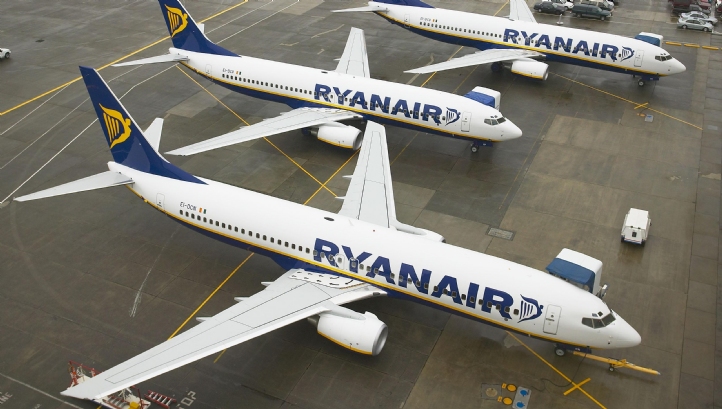Irish airline Ryanair was the EU’s ninth highest corporate carbon emitter in 2018, making it the first corporate without holdings in coal-fired power plants to ever rank within the bloc’s top 10 most emitting firms.

Ryanair transported 130 million passengers and declared 9.9 megatonnes of greenhouse gas emissions in 2018
That is the key conclusion of new research by industry think tank Transport and Environment (T&E), which used data in the EU’s latest emissions trading system registry to rank large corporates across the bloc on their overall carbon footprint.
The research reveals that Ryanair declared 9.9 megatonnes of greenhouse gas emissions in 2018, up 6.9% on last year and 49% over the last five years.
In comparison, the next worst-performing European airline in the rankings was EasyJet, which ranked 31st after an 11% year-on-year rise in emissions between 2017 and 2018.
The rest of the top 10, meanwhile, is accounted for by coal companies. The most carbon-intense company in the bloc is listed as Poland’s Bełchatów power station and coal mine, which generated 38 million megatonnes of greenhouse gas (GHG) emissions last year, with the top three being rounded off by Germany’s Neurath and Niederaussem coal plants. Indeed, German coal mines account for seven of the top ten.
Responding to the findings, a Ryanair spokesperson claimed the company is actually the “greenest and cleanest airline” in the EU, due to the fact that it has the lowest CO2 emissions per kilometre travelled per passenger of any airline across the bloc.
This is largely due to its investment in space-saving layouts and modern, energy-efficient aircraft in recent years.
But T&E has been quick to point out that European airlines collectively receive up to 85% of their EU emissions trading allowances for free, discouraging them from investing in low-carbon fleets. The organisation claims that Ryanair would have had to pay additional €96.6m for its 2018 trading allowances if this were not the case.
“When it comes to climate, Ryanair is the new coal,” T&E’s aviation manager Andrew Murphy said.
“This trend will only continue until Europe realises that this under-taxed and under-regulated sector needs to be brought into line, starting with a tax on kerosene and the introduction of mandates that force airlines to switch to zero-emission jet fuel.”
A flying start to the low-carbon transition?
T&E’s call to action comes at a time when aviation is widely estimated to account for 2% of all global carbon emissions, and 12% of the transport sector’s GHG emissions. Recent research has also found that flights will generate around 43 gigatonnes of CO2 emissions by 2050 – more than 4% of the world’s entire remaining carbon budget.
In response to the issue, investors to have backed the Transition Pathway Initiative (TPI) – a research group at the London School of Economics’ Grantham Research Institute – recently issued a warning to airlines that they will face losing key investments unless they set long-term emissions reductions aims aligned with the Paris Agreement’s 2C trajectory. The investor coalition behind the call to action is responsible for more than $13trn in assets under management (AUM) collectively.
Airports are also bolstering their efforts to incentivise airlines to decarbonise. Heathrow, for example, has already increased its environmental charges for aircraft by 7% and has committed to waive a year’s worth of landing charges for the world’s first electric passenger plane once it is developed. It additionally runs a £30m competition to support emerging green technologies, with the 2019 scheme having opened to applications this week.
In tandem to this action from industry and investors, the challenge of decarbonising aviation has risen up the global policy agenda in recent times, with the UK Government having last December published its sector deal for aviation as part of its Industrial Strategy. The deal notably sets aside up to £125m worth of funding for projects researching and developing innovative and green aircraft, including electric passenger planes, automated drones and zero-emission air taxis capable of vertical lift-off, and an additional £13.7m to help SMEs scale green aviation technologies.
Nonetheless, groups such as T&E have continually warned that stricter legislation is the only factor which will halt the growth of aviation emissions. Policy recommendations from the group include the banning of free emissions allowances in the EU emissions trading system, the introduction of a kerosene tax and the introduction of VAT on tickets.
Sarah George
